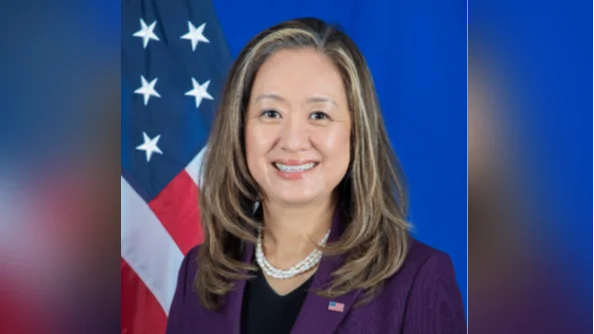Julie Chung, U.S. Ambassador to Sri Lanka, addressed participants at the Near East South Asia (NESA) Center for Strategic Studies seminar on human trafficking held in Colombo on August 25, 2025. The seminar marked the NESA Center’s first return to Sri Lanka since 2017 and brought together security officials, policymakers, and experts from West Africa, Europe, and Southeast Asia.
Chung welcomed attendees and expressed gratitude to Dr. Hassan Abbas, Distinguished Professor and Course Director at the NESA Center, for his leadership in organizing the event. She highlighted the global threat of human trafficking and its impact on national and international security.
"Human trafficking can affect us all, no one is immune. If we blame victims for falling prey to trafficking, we do them, our countries, and ourselves a grave disservice. Men, women, and children are all susceptible to forced labor, sexual exploitation, and even forced criminality. This is an issue that we must care about because of its impact on national and international security," said Chung.
She pointed out examples such as cyber scam camps operated by organized criminal groups in multiple Asian countries: "Take the trafficking of tens of thousands of men and women to cyber scam camps in multiple countries in Asia. These are in effect actual cities run by internationally organized criminal groups. These criminals enslave men and women and generate billions of dollars in untaxed revenue. These traffickers control land inside sovereign countries. And they not only victimize people under their direct control but also individuals from around the world through Internet scams... What happens when criminals become stronger than a government?"
Chung emphasized that failing to address trafficking promptly can escalate into broader international security problems: "This is only one example of what can happen when trafficking is not dealt with quickly and effectively and it explodes into an international security problem. Human trafficking is a crime that knows no borders..."
She discussed how traffickers exploit weaknesses such as porous borders and technological advancements to expand their networks.
Highlighting U.S efforts against human trafficking, Chung explained: "The United States has long been committed to the fight against human trafficking. Our approach is guided by the principles of prevention, protection, and prosecution..." She outlined prevention through addressing root causes like poverty; victim protection including rehabilitation; and prosecution as necessary for dismantling networks.
"But the United States recognizes that this fight cannot be won alone," she added. "Human trafficking is a transnational crime...it demands a globally integrated response."
The ambassador noted Sri Lanka's key role due to its location: "Sri Lanka, with its strategic location in the Indian Ocean, plays a pivotal role in this fight. As a transit point for trafficking routes, Sri Lanka’s commitment to strengthening border governance...is critical to regional stability."
Chung called for greater collaboration among nations: "As we move forward let us remember that combatting human trafficking is not just about enforcement; it is about building resilience...This seminar is an opportunity to exchange ideas...that will strengthen all of our collective response."
She concluded by encouraging participants’ engagement throughout the seminar: "Ask questions, challenge assumptions...Your work is not easy but it is essential." Chung reaffirmed ongoing U.S support alongside partners worldwide: "The United States remains steadfast in its commitment...and we are proud to stand alongside our partners in Sri Lanka..."
###

